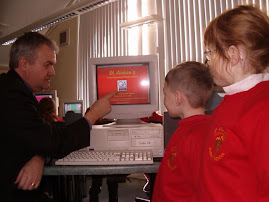
Why Do Teachers Resist Using ICT?
Latest Poll Results By Terry Freedman
Why are many teachers reluctant to use ICT in their lessons. Here are the latest results from the poll I set up to find out.It's based upon the opinions of about 80 people, and no it isn't scientific. It's intended purely asa starting point for debate.
The least important factor was a fear of what students might get up to if they were to be given access to the technology.asked this question, suggested some answers, and gave readers the opportunity to have their say in the form of an online poll. I've got some interesting results to share with you.
Teaching chartsBecta will be disappointed to learn that the single biggest #1 reason is that teachers cannot see the net benefit of using computers. That was cited by nearly 50% of the respondents as the primary reason for not using technology in their lessons.The most-cited second reason was unreliable networks, which at nearly 20% of the respondents tied with "too difficult to learn".In third place (nearly a quarter of the responses) comes "too difficult to learn" once again.These results should make us concerned in themselves, but we get an even more interesting result when we look at the cumulative totals. (Remember, respondents were asked to give their top 7 reasons for teachers' reluctance to embrace educational technology.)The least important factor, apart from "Other", was a fear of what students might get up to if they were to be given access to the technology, whilst one of the largest was lack of access to personal computing.If you'd like to put your two pence-worth in, read the article and then take part in the poll, or just go straight to the poll -- it takes 2 minutes to complete. Go on, contribute to the debate.
Teaching chartsBecta will be disappointed to learn that the single biggest #1 reason is that teachers cannot see the net benefit of using computers. That was cited by nearly 50% of the respondents as the primary reason for not using technology in their lessons.The most-cited second reason was unreliable networks, which at nearly 20% of the respondents tied with "too difficult to learn".In third place (nearly a quarter of the responses) comes "too difficult to learn" once again.These results should make us concerned in themselves, but we get an even more interesting result when we look at the cumulative totals. (Remember, respondents were asked to give their top 7 reasons for teachers' reluctance to embrace educational technology.)The least important factor, apart from "Other", was a fear of what students might get up to if they were to be given access to the technology, whilst one of the largest was lack of access to personal computing.If you'd like to put your two pence-worth in, read the article and then take part in the poll, or just go straight to the poll -- it takes 2 minutes to complete. Go on, contribute to the debate.
So why aren't you doing it?
ICT or educational technology? John Cuthell suggested a few ideas, which I've built on and incorporated in a poll (also suggested by John). Read on for more details, and say what you think.These are the factors which John identified, although the commentary is mine (I don't want to put words into John's mouth!):
Unreliable network
At one school I started working at, as an ICT (Technology) co-ordinator, the computer networks were completely unreliable. They would break down for no apparent reason. Needless to say, none of the teachers would take the chance of taking a class of kids into the computer labs.There were two reasons for the breakdowns. One of the networks was easy to diagnose: it was ancient, using a computer known as a 480z (and it even included a 380z). The more modern network was unreliable because there was a faulty wire inside the wall. Once these two issues, especially the faulty wiring, were sorted out, we were cooking. Well, it was a very slow cook but at least we'd got started.
No access to personal computing
Nobody can be expected to fully understand the benefits of educational technology if they don't have access to it when they need it, and for their own personal use. That's why the UK's Laptop for Teachers scheme was such a good idea, despite its limitations because of financial considerations.
Technical lockdown that prevents innovation
I think we've all been in the situation where the technical support staff seem to be more concerned with security than innovation and learning. Ultimately, this is a senior management issue, because the Headteacher or Principal should be saying: "We want to be able to achieve X: please find a way that we can do so without compromising security." For example, if the Headteacher decides that it would be educationally beneficial for students to share videos over the internet, the technical support team should be tasked with finding a way to make that possible and safe. They should not have the authority to merely block it. This raises another issue, of course, and one which I deal with time and again in our Leading and Managing Educational Technology subscription: this is not a technical issue, but a management issue.
Distrust of what students will get up to
Quite understandable, but as long as you realise that students will always find ways of circumventing controls, you can learn to live with it by adopting three strategies. One, the school should talk to students to find out what they get up to and what the security holes are. Two, teachers must learn to use educational technology: I don't think it's good enough to keep saying "I don't understand this new-fangled stuff". I was using computers in my classroom 30 years ago: how long does something have to be around before it's no longer regarded as new? Three: if the curriculum and lessons are interesting enough, most students won't want to mess around anyway.The remaining points are mine.
Too difficult to learn
Personally, I give up on something if I can't master the basics without a manual in 5 or 10 minutes. There just isn't the time.
Poor classroom support, poor technical support, poor CPD
In essence, you can't just expect teachers to venture into the unknown with a lifeline. You need to have a support infrastructure which includes classroom assistants (and their training), technical support for when (not if) things go wrong, and support in he form of continuing professional development (CPD) opportunities.
Cannot see net benefit of using it
Teachers may be able to see the benefits, but there are also costs -- not least the risk of failing in some sense. These days, despite what anyone says, grades are everything. I think you have to be a pretty brave teacher to take chances. So, what matters here is not whether teachers think there are benefits, but whether the perceived benefits (note the word "perceived") outweigh the perceived costs.





































_JPG.jpg)
_JPG.jpg)
_JPG.jpg)
_JPG.jpg)
_JPG.jpg)

No comments:
Post a Comment